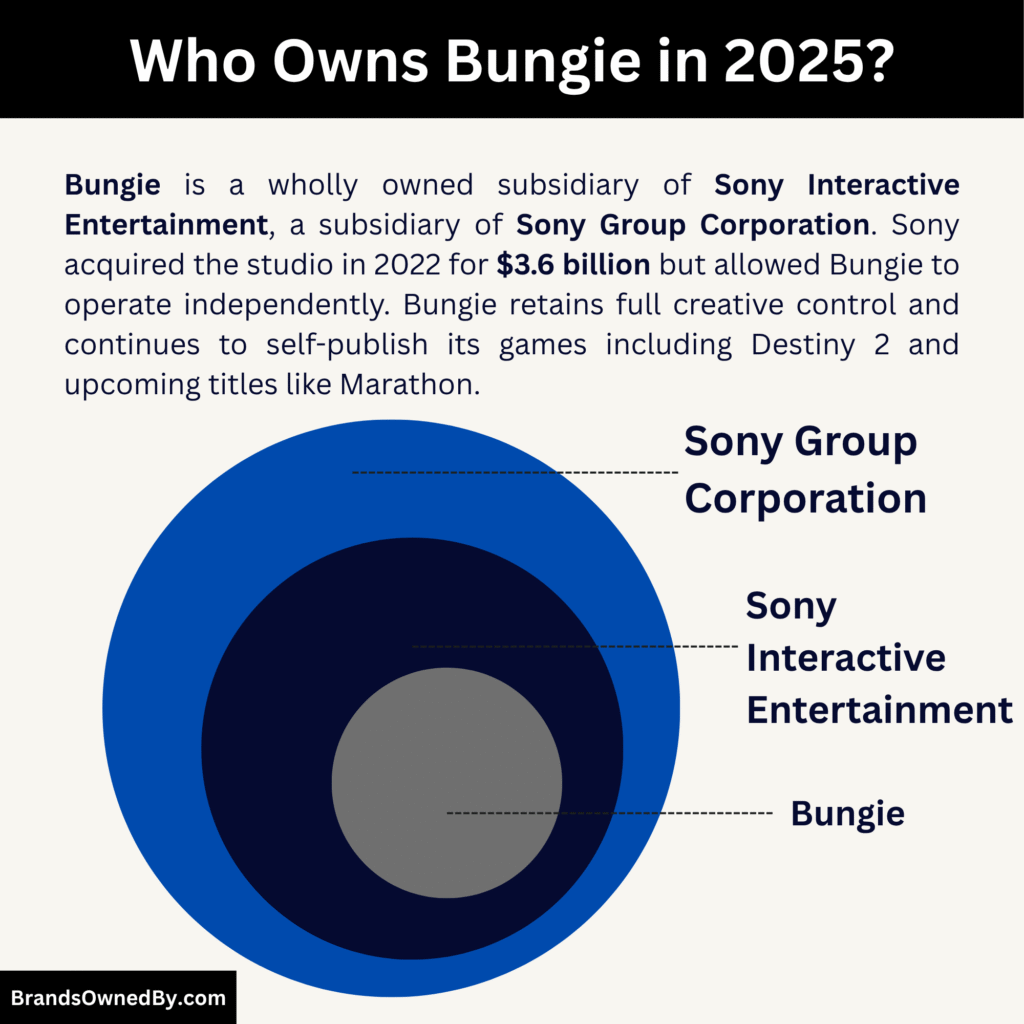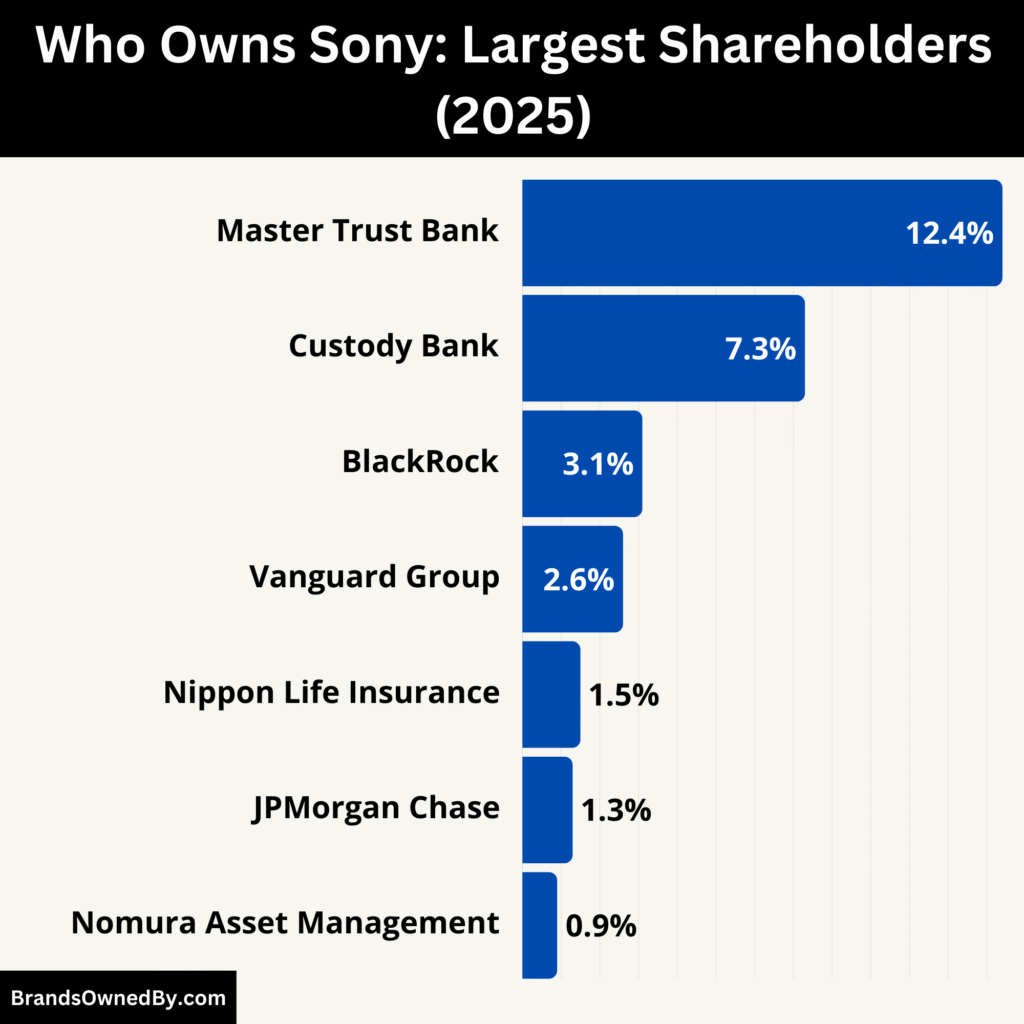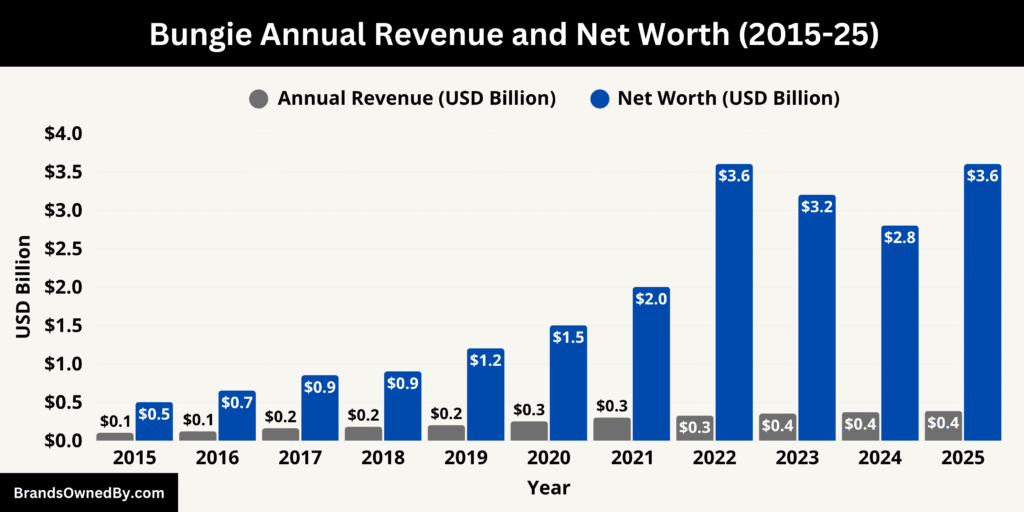Bungie is a well-known name in the gaming world, especially recognized for franchises like Halo and Destiny. If you’re wondering who owns Bungie, the answer has evolved over time—from independence to corporate acquisitions. Here’s a complete look at the company’s profile, ownership, leadership, and what lies behind the scenes.
Bungie Company Profile
Bungie, Inc. is a prominent American video game developer headquartered in Bellevue, Washington. Best known for creating legendary franchises like Halo and Destiny, Bungie has shaped the gaming landscape for over three decades. While it started as a small independent studio, it has evolved into a global force in online multiplayer and live-service games.
As of 2025, Bungie operates under Sony Interactive Entertainment, focusing on expanding the Destiny universe and developing new IPs, while also contributing to Sony’s push into live-service gaming.
Company Details
- Name: Bungie, Inc.
- Headquarters: Bellevue, Washington, USA
- Industry: Video Game Development
- Ownership: Wholly owned by Sony Interactive Entertainment (since July 2022)
- Employees: Over 1,200 (as of 2025)
- Flagship Titles: Halo (legacy), Destiny, Destiny 2, new IP in development (codename Matter)
- Global Presence: Offices in North America and Europe (including Bungie Amsterdam).
Founders
Bungie was founded in May 1991 by:
- Alex Seropian – A University of Chicago student who started Bungie to publish his game Gnop!
- Jason Jones – Later joined and co-created Minotaur: The Labyrinths of Crete with Seropian. Jones played a crucial role in shaping the design and gameplay vision for Bungie’s key franchises.
Together, they built Bungie from a dorm-room project into a major game studio.
Major Milestones
1994: Marathon trilogy becomes Bungie’s first big hit on Macintosh computers, gaining a cult following.
1997: Bungie releases Myth: The Fallen Lords, showcasing its real-time tactical strategy capabilities.
2000–2001: Bungie is acquired by Microsoft and launches Halo: Combat Evolved, the launch title for the original Xbox. The game becomes a blockbuster and defines the Xbox brand.
2004–2007: Bungie releases Halo 2 and Halo 3, which break sales records and build the Halo universe into a major franchise.
October 2007: Bungie regains its independence from Microsoft but allows Microsoft to retain the Halo IP. Bungie focuses on building new IPs.
2010: Bungie signs a 10-year publishing deal with Activision Blizzard. Development of Destiny begins.
2014: Bungie releases Destiny, followed by Destiny 2 in 2017. These titles pioneer the live-service multiplayer shooter genre.
2019: Bungie ends its publishing partnership with Activision and assumes full control over the Destiny franchise. It begins self-publishing its titles.
2021: Bungie opens a new office in Amsterdam, expanding its global presence and support for European operations.
July 2022: Bungie is acquired by Sony Interactive Entertainment for $3.6 billion. The deal is structured to maintain Bungie’s creative and publishing independence.
2023–2025: Bungie continues expanding Destiny 2 with major content updates and begins active development on a new IP (codename Matter), expected to release by 2026. It also collaborates with other Sony studios to support live-service experiences across the PlayStation ecosystem.
Who Owns Bungie?

As of 2025, Bungie is wholly owned by Sony Interactive Entertainment (SIE), a subsidiary of Sony Group Corporation. Sony acquired Bungie in a landmark deal announced in January 2022 and finalized in July of the same year. Although Bungie is now part of Sony’s PlayStation family, it continues to operate independently, with full control over its creative direction and publishing strategies.
The deal was structured to allow Bungie to maintain its unique studio culture, development freedom, and multiplatform presence.
Parent Company: Sony Interactive Entertainment

Sony Interactive Entertainment, the gaming division of Sony Group, is the parent company of Bungie. It oversees all gaming-related operations including the PlayStation consoles, game development studios, and live-service initiatives.
Bungie plays a special role in Sony’s strategy. While most other Sony-owned studios focus on PlayStation-exclusive games, Bungie is helping Sony expand into multiplatform and live-service gaming, with titles available on PC and Xbox in addition to PlayStation.
Bungie’s operational independence within Sony allows it to self-publish games, manage its own community platforms, and make strategic decisions without direct interference from its parent company.
Why Sony Acquired Bungie
Sony’s acquisition of Bungie was driven by several strategic goals:
- Expand into live-service games: Bungie is considered a leader in live-service experiences, especially with Destiny 2.
- Boost multiplatform presence: Sony wanted to diversify beyond PlayStation-exclusive content.
- Leverage Bungie’s technology and expertise: Bungie’s online infrastructure and game development tools can support other Sony studios.
- Strengthen IP portfolio: Bungie has strong existing IPs and is working on new ones that Sony can help scale globally.
Terms of the Deal
- Total value: $3.6 billion
- Retention incentives: $1.2 billion of the acquisition price was set aside specifically to retain Bungie’s existing talent and leadership team.
- Creative independence: A core condition of the deal was that Bungie would continue to control its own game roadmap, community strategy, and publishing plans.
- Multiplatform commitment: Bungie confirmed that future titles would remain available on platforms beyond PlayStation, including PC and Xbox.
Post-Acquisition Developments
Since the acquisition:
- Bungie has expanded its workforce and studio capabilities, including the Amsterdam office.
- It has continued to update Destiny 2 with new expansions and seasonal content.
- Bungie is also developing a new intellectual property (IP), with an expected release in late 2025 or early 2026.
- Bungie is actively involved in helping Sony build a robust live-service ecosystem across its other first-party studios.
Other Details
- Bungie remains a self-publishing studio. Even though it is owned by Sony, it retains control over marketing, pricing, and distribution.
- Employees at Bungie were significant stakeholders before the acquisition. A portion of the Sony deal involved cashing out early investors and allocating long-term incentive packages for Bungie’s team.
- Jason Jones, co-founder of Bungie, continues to play a key role behind the scenes, especially in new game development.
Who is the CEO of Bungie?
As of July 2025, Pete Parsons serves as the CEO of Bungie. He joined the company in 2002 and became CEO in 2016. Parsons has played a crucial role in guiding Bungie through its transition from being an Activision partner to an independent studio, and now under Sony.
Pete Parsons: CEO and Chairman
Pete Parsons has served as Bungie’s Chief Executive Officer and Chairman of the Board since 2016. He originally joined Bungie in 2002 from Microsoft, working as an executive producer and studio manager during the Halo era.
Parsons rose through the ranks as Bungie navigated independence from Microsoft, the partnership with Activision, and its full return to self-publishing. His tenure as CEO began shortly before Bungie entered its long-term deal with Activision, which shaped the Destiny franchise.
Leadership Structure and Decision-Making Style
Pete Parsons leads a studio-led structure. In this framework, Bungie retains autonomy over key creative, operational, and publishing decisions. Even after the Sony acquisition in 2022, Parsons has maintained full control over Bungie’s roadmap, community strategy, and development priorities.
He is known for championing Bungie’s ambition to evolve Destiny into a continuously evolving live‑service world, while also building new franchises under Bungie’s own publishing label. He has pursued a vision to transform Bungie into a multi‑franchise entertainment company by 2025.
Key Challenges and Studio Restructuring
During his time as CEO, Parsons has overseen one of Bungie’s most turbulent periods:
- In October 2023, Bungie laid off around 100 employees following poor revenue performance from Destiny 2: Lightfall.
- In July 2024, another round of layoffs cut about 220 staff—nearly 17% of the studio—as part of a strategic refocus on Destiny 2 and the upcoming title Marathon. Parsons personally announced the moves in a public post, citing economic conditions and rising development costs.
These decisions drew internal and external criticism. Some former employees blamed studio overexpansion under his leadership, and staff raised concerns about Parsons’ high personal expenditures on classic cars amid workforce cuts.
Vision for Bungie’s Future
Despite these challenges, Parsons has continued driving Bungie toward its long-term goals:
- Deepening integration with Sony while maintaining Bungie’s creative independence. That includes freeing up management of certain projects and moving 155 Bungie roles into Sony Interactive Entertainment.
- Leading development on Marathon, Bungie’s first major new IP in over a decade. The game was shown in alpha tests in spring 2025 and remains slated for release in late 2025.
- Supporting the launch of Team LFG, a studio spun out of Bungie incubation and now part of PlayStation Studios, to build new multiplayer and live-service experiences inspired by Destiny.
Past Leadership
Before Parsons took the helm, Bungie’s executive leadership included:
- Harold Ryan, who led the studio from 2008 to 2016.
- Jason Jones, co‑founder, was a key creative leader during the Microsoft era and early corporate transitions, though he never held the formal CEO title.
Bungie Annual Revenue and Net Worth

As of July 2025, Bungie’s annual revenue is estimated at around $385 million, with potential to exceed $500 million. Its net worth stands near $3.6 billion based on Sony’s acquisition price, or roughly $2.5 billion in independent valuations.
2025 Annual Revenue
In 2025, Bungie’s annual revenue is estimated in the range of $385 million to over $500 million. Analysts at Compworth and IncFact place this figure at approximately $385.6 million, while broader estimates suggest it may exceed $500 million.
These estimates reflect earnings from Destiny 2 sales, expansions, seasonal content, and in‑game purchases, including microtransactions and DLC.
Revenue performance has recently come under pressure. Internal projections show Bungie missed its 2023 revenue targets by up to 45 percent, driven by declining engagement in Destiny 2 and underperformance of key expansions like Lightfall. This shortfall led to multiple rounds of layoffs in late 2023 and mid‑2024. Sony executives have since emphasized stronger financial discipline and more realistic budgeting under Bungie’s leadership.
Net Worth and Valuation
Bungie’s current valuation is widely reported at $3.6 billion, consistent with the purchase price paid by Sony Interactive Entertainment in mid‑2022. Alternative valuations place the studio’s net worth at around $2.5 billion, reflecting intangible assets such as its Destiny IP, future development potential, and live‑service infrastructure.
The discrepancy between net worth estimates and acquisition valuation can be attributed to expected future earnings and IP monetization: Sony paid a premium partly to ensure long‑term returns and to reinforce its live‑service strategy.
Here is a 10-year historical revenue and estimated net worth table for Bungie, Inc. from 2015 to 2025:
| Year | Estimated Annual Revenue | Estimated Net Worth | Key Events/Context |
|---|---|---|---|
| 2015 | $100 million | $500 million | Post-Destiny launch success with growing player base |
| 2016 | $120 million | $650 million | The Taken King expansion boosts revenue |
| 2017 | $160 million | $850 million | Destiny 2 launches in September 2017 |
| 2018 | $180 million | $900 million | Ongoing Destiny 2 support under Activision |
| 2019 | $200 million | $1.2 billion | Bungie ends partnership with Activision and gains full control of Destiny |
| 2020 | $250 million | $1.5 billion | Beyond Light expansion released; self-publishing gains momentum |
| 2021 | $300 million | $2.0 billion | The Witch Queen announced, strong pre-orders, Sony acquisition rumors |
| 2022 | $325 million | $3.6 billion | Sony acquires Bungie for $3.6B; net worth peaks based on purchase value |
| 2023 | $350 million | $3.2 billion | Revenue falls short of projections; layoffs begin |
| 2024 | $370 million | $2.8 billion | Delay of The Final Shape; studio restructures, more layoffs |
| 2025 | $385–500 million | $2.5–3.0 billion | Release of The Edge of Fate, new IP (Marathon) in development |
Factors Influencing Financial Metrics
Bungie’s net worth and revenue closely tie to the performance of Destiny 2 as a live-service game. While the franchise once generated consistent profitability, recent delays, project restructuring, and fan dissatisfaction have strained revenue growth. The studio’s development of new IPs, such as Marathon and other live multiplayer titles within Sony’s ecosystem, is crucial for reversing the revenue decline and validating its valuation.
Sony allocated approximately $1.2 billion of the acquisition funds to retain Bungie’s talent, aiming to stabilize leadership and ensure continuity during the integration phase. This retention pool demonstrates how much Sony values Bungie’s human capital as part of its net worth equation.
Strategic Outlook Through 2025
Looking ahead, Bungie’s revenues in 2025 will depend on the success of Destiny 2: The Edge of Fate, the first expansion of its new “Fate” saga released on July 15, 2025. This expansion marked a shift to more frequent, medium‑scale updates and overhauled player progression systems. Healthy reception of this content could help Bungie regain momentum after the “Light and Darkness” saga.
Meanwhile, new projects like Marathon remain central to Sony’s long-term ROI on Bungie. The alpha and marketing cycle have faced delays, but completion and launch by late 2025 or early 2026 are still critical for unlocking future revenue streams and affirming the studio’s market value
Brands Owned by Bungie
Here is a list of the major companies, brands, and entities owned by Bungie as of 2025:
| Entity/Brand | Type | Ownership | Primary Function | Launch/Status | Key Notes |
|---|---|---|---|---|---|
| Destiny Franchise | Game/IP | Wholly owned by Bungie | Live-service FPS/MMO franchise (Destiny and Destiny 2) | Ongoing (2014–present) | Main revenue generator, fully self-published post-2019 |
| Marathon | Game/IP | Wholly owned by Bungie | PvP extraction shooter, revival of classic Bungie IP | In development (Reboot) | Not a remake; standalone reboot slated for 2025–2026 |
| Matter (Working Title) | New IP in development | Wholly owned by Bungie | Secretive project exploring new world, gameplay mechanics, and player interaction | Internal incubation since ~2018 | Early dev phase; expected to be revealed post-Marathon |
| Bungie Amsterdam | Studio/Division | Owned and operated by Bungie | European operations hub for publishing, live ops, and support | Established in 2021 | Expands Bungie’s global footprint; assists with time-zone-aligned support |
| Bungie.net | Digital Platform | Fully owned by Bungie | Central online platform for game services, news, community, and account management | Ongoing | Integrates cross-platform services, forums, lore, and player data |
| Bungie Companion App | Mobile/Digital App | Fully owned by Bungie | Mobile app for game support, inventory management, and messaging | Ongoing | Directly tied to Destiny and other future Bungie titles |
| Bungie Publishing | Internal Publishing Division | Operated by Bungie | In-house label for all Bungie-developed titles | Created post-Activision split (2019) | Maintains multiplatform independence under Sony ownership |
| Incubation Teams | Internal Development Units | Operated by Bungie | Experimental groups focused on prototyping new games and technologies | Active (ongoing) | Produced early versions of Matter; explores AI, cloud, narrative systems |
Destiny Franchise
The Destiny universe is Bungie’s flagship brand. Launched in 2014 and expanded with Destiny 2 in 2017, it is the studio’s primary live-service property. As of 2025, Bungie fully owns the IP, including all publishing, narrative, and monetization rights.
Destiny 2 remains a central revenue driver, with expansions like The Final Shape (2024) and The Edge of Fate (2025) continuing to evolve the narrative. Bungie manages the in-game Eververse store, seasonal content, PvP and PvE events, and platform publishing directly.
Although some Destiny-related media content has been explored, including discussions around comics, animated shorts, or cinematic extensions, Bungie retains full creative and operational control over all Destiny projects under its brand umbrella.
Marathon
Marathon is Bungie’s upcoming extraction-based sci-fi PvP shooter and a revival of its 1990s IP. It is not a sequel to the original Marathon trilogy but is a modern reimagining within a new gameplay structure.
The new Marathon title is being developed entirely in-house. The brand was revealed in 2023 and entered alpha testing in early 2025. A full release is expected between late 2025 and early 2026. This game represents Bungie’s effort to expand into competitive multiplayer territory with strong live-service systems. Bungie owns the Marathon IP and all associated publishing rights.
Matter (Working Title)
Matter is a still-unannounced new IP that Bungie has been developing since the late 2010s. Though not officially revealed, job listings and internal development reports confirm that the game is set in a brand-new sci-fi or fantasy world, distinct from Destiny or Marathon. The project is believed to have a heavy focus on character design, social interaction, and narrative.
The brand Matter is being incubated as a possible franchise beyond gaming, including the potential for expanded media, though no spin-offs have been announced yet. Bungie owns the brand and continues internal testing and iteration as of 2025.
Bungie Amsterdam
Bungie Amsterdam is a fully owned subsidiary studio of Bungie, established to support global publishing, live operations, and community management. Located in the Netherlands, this studio plays a key role in managing Destiny’s European operations and provides strategic support for future IPs. It was created to strengthen Bungie’s international presence and streamline live-service infrastructure across global time zones.
Bungie Amsterdam is not a standalone developer but rather an operational arm of Bungie Inc., functioning under the same leadership and internal structure.
Bungie.net and Bungie Companion App
Bungie owns and operates its official website and the Bungie Companion App, both of which are integral to its platform-independent publishing model. These entities offer player support, lore integration, forums, account services, and inventory management across all major titles.
The website and app also serve as the central hubs for updates, community interaction, and in-game reward tracking. Unlike many other developers that outsource these functions, Bungie keeps its digital platforms in-house to maintain control and personalization.
Bungie Publishing Division
Established formally after its split from Activision in 2019, Bungie Publishing is the internal label under which all Bungie IPs are self-published. This division was strengthened significantly after the Sony acquisition in 2022, and while Bungie retains publishing autonomy, it now collaborates with Sony Interactive Entertainment for platform strategy.
Bungie Publishing handles localization, market release plans, product positioning, advertising, and merchandising for all Bungie-owned games. It also oversees development pipelines and cross-team collaboration across Bungie’s internal studios.
Incubation Teams and Experimental IP Units
Bungie maintains several internal “incubation teams,” dedicated to exploring new ideas, gameplay mechanics, and IP development. These teams function somewhat independently, with small budgets and limited public exposure until concepts are validated. These groups are responsible for the earliest versions of Matter and are actively experimenting with emerging technologies, including AI-driven narrative systems and cloud-native multiplayer gameplay.
Final Thoughts
Bungie’s journey from an indie studio to a Sony-owned entity has been full of milestones. If you’re wondering who owns Bungie, the answer is clear: it is fully owned by Sony Interactive Entertainment. But what makes the story interesting is that Bungie operates with a level of independence rarely seen in such acquisitions.
With new games in the pipeline and continued updates to Destiny 2, Bungie remains a key player in the global gaming landscape. Its model of creative freedom under corporate ownership could be a blueprint for future studio acquisitions.
FAQs
Why did Sony buy Bungie?
Sony bought Bungie to strengthen its presence in the live-service gaming space and expand its multiplatform capabilities. Bungie’s expertise with Destiny made it a key asset for Sony, which was looking to diversify beyond traditional single-player exclusives. The acquisition also allows Sony to access Bungie’s technology, publishing experience, and development pipeline for future franchises.
Who currently owns Destiny 2?
Destiny 2 is fully owned and operated by Bungie, which is itself a wholly owned subsidiary of Sony Interactive Entertainment. Bungie controls all aspects of the game, including development, publishing, live operations, and monetization, even after the acquisition by Sony.
Did Bungie sell Halo to Microsoft?
Bungie did not exactly “sell” Halo to Microsoft, but when Microsoft acquired Bungie in 2000, it also gained full rights to the Halo intellectual property. When Bungie regained its independence in 2007, Microsoft retained ownership of Halo. The franchise is now managed by 343 Industries, a Microsoft studio.
Did Sony overpay for Bungie?
The $3.6 billion price tag was seen by some as high, especially since Bungie had only one active franchise—Destiny. However, Sony’s payment included $1.2 billion set aside specifically for employee retention. Sony considered Bungie’s expertise in live-service development, multiplatform experience, and new IPs in progress as part of the long-term strategic value. Whether it was an overpayment depends on the future success of titles like Marathon and Matter.
Is Pete Parsons still CEO of Bungie?
Yes, Pete Parsons remains the CEO of Bungie as of 2025. He has held the role since 2016 and continues to lead the studio through its integration with Sony, development of new IPs, and restructuring after recent financial challenges.
What was Bungie’s first game?
Bungie’s first game was Gnop!, a simple Pong-style game created by co-founder Alex Seropian in 1990. However, the studio’s first commercial release was Minotaur: The Labyrinths of Crete in 1992, developed for Macintosh computers.
How much did Sony pay to buy Bungie?
Sony acquired Bungie for $3.6 billion in a deal finalized in July 2022. The deal included $1.2 billion earmarked for employee retention and incentives, with the rest covering valuation, IP rights, and full ownership.
Why did Activision leave Bungie?
The split between Bungie and Activision in 2019 was mutual. Bungie wanted more control over its IP and publishing decisions, while Activision was reportedly dissatisfied with the revenue performance of Destiny 2. After the split, Bungie retained full rights to the Destiny franchise and began self-publishing.
Who owned Bungie before Sony?
Before Sony’s acquisition, Bungie was an independent studio owned by its employees, founders, and private investors. It became fully independent in 2007 after parting ways with Microsoft, and it remained so even after the publishing partnership with Activision ended in 2019.
Was Bungie owned by Microsoft?
Yes, Microsoft acquired Bungie in 2000. During this period, Bungie developed Halo: Combat Evolved and helped launch the original Xbox console. Bungie remained a Microsoft subsidiary until 2007, when it regained its independence, while Microsoft retained the Halo IP.
When did Sony buy Bungie?
Sony officially completed its acquisition of Bungie in July 2022. The deal was announced in January 2022 and finalized later that year, making Bungie a wholly owned subsidiary of Sony Interactive Entertainment, but with operational independence.
Is Bungie still independent?
Bungie is owned by Sony but retains operational independence. It still manages its own publishing and creative decisions.
Does Bungie only make PlayStation games now?
No. Bungie continues to support and develop games for multiple platforms, including Xbox and PC.
What happened to Bungie’s deal with Activision?
Bungie ended its publishing deal with Activision in 2019 and took full control of Destiny. The split was amicable, and Bungie resumed self-publishing.
Is Destiny still made by Bungie?
Yes. Bungie is still the developer of Destiny 2 and continues to release expansions and seasonal content.

